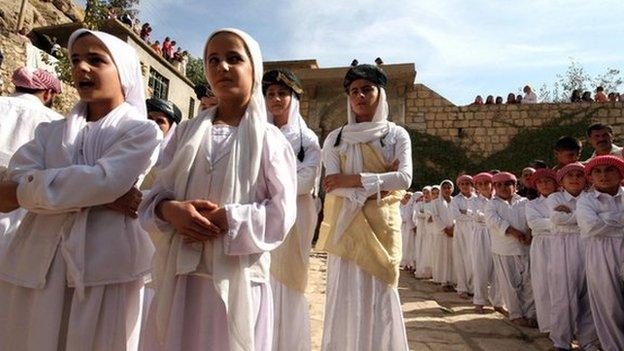Obama authorises Iraq air strikes on Islamist fighters
- Published
President Obama said the the US would act "carefully and responsibly", as Mike Wooldridge reports
US President Barack Obama says he has authorised air strikes against Islamic militants in northern Iraq but will not send US troops back to the country.
He said Islamic State (IS) fighters would be targeted to prevent the slaughter of religious minorities, or if they threaten US interests.
Strikes have not yet begun, but the US has made humanitarian air drops to Iraqis under threat from the militants.
IS has seized Qaraqosh, Iraq's biggest Christian town, forcing locals to flee.
The Sunni Muslim group, formerly known as Isis, has been gaining ground in northern Iraq and Syria for several months.

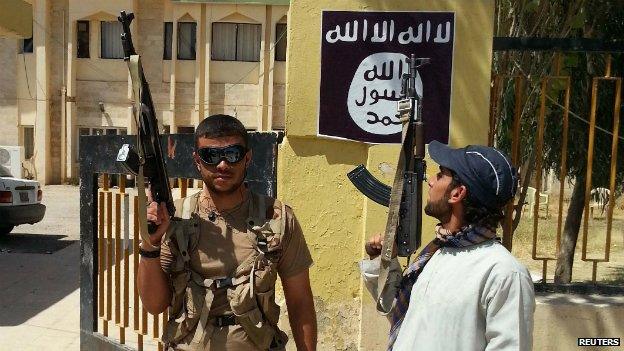
Islamic State fighters have taken control of large parts of northern Iraq since launching an offensive in June
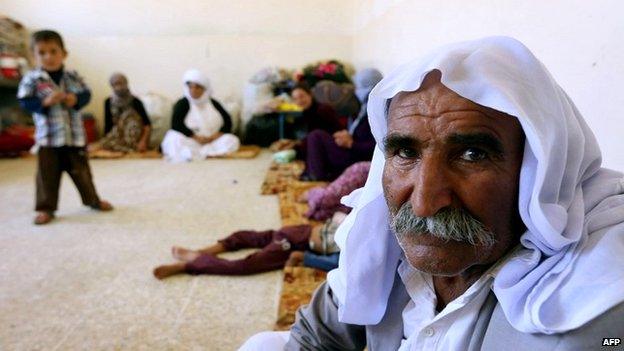
Around 50,000 Yazidis are thought to have been trapped on a mountain after fleeing IS fighters
In a rapid advance in June the group took control of the northern city of Mosul and advanced south towards Baghdad.
It now controls large swathes of Iraq and Syria and says it has created an Islamic caliphate in its territory.
'Coming to help'
Speaking at the White House, external, Mr Obama said US military aircraft had already dropped food and water to members of the Yazidi religious minority community trapped on Mount Sinjar by IS fighters.
The UN estimates that about 200,000 civilians have been displaced from the town of Sinjar and about 50,000 Yazidis are thought to have been trapped on the mountain.
The Yazidis face starvation and dehydration if they remain on the mountain, and slaughter at the hands of the IS if they flee, officials have warned.
Tens of thousands of Iraqi Christians and Yazidis are understood to have fled their homes, as James Robbins reports
Mr Obama said the Iraqi government had requested assistance and the US would act "carefully and responsibly, to prevent a potential act of genocide".
US air strikes would target IS fighters if they threaten Baghdad or move towards the Kurdish capital of Irbil, where there is a significant presence of US diplomats and military advisers, Mr Obama said.
In addition, he authorised strikes "if necessary" to help Iraqi government forces break the siege at Mount Sinjar and rescue the trapped civilians.
"The only lasting solution is reconciliation among Iraqi communities and stronger Iraqi security forces," Mr Obama added.

Analysis: Tom Esslemont, BBC News, Washington
For a president still busy withdrawing his troops from Afghanistan, the situation in northern Iraq has proved decisive.
Doing nothing here was not an option and the US could not turn a blind eye to what Mr Obama called the systematic destruction of Christians and Yazidis.
He employed strong language to seek justification. It was, he said, to prevent acts of genocide.
It is a hugely symbolic and potent term for a president who a year ago decided against military intervention in Syria. And that was after a red line had been crossed and chemical weapons had been used.
This time, just across the border, the White House has a specific goal - the protection of US assets and embassy personnel in Iraq and to bring urgent relief to the civilians affected.
But to critics it is too limited an operation that will do little to diminish the power of the Islamic State jihadists.

The president spoke hours after the UN Security Council met. UN Secretary-General Ban Ki-moon said he was "deeply appalled" by the situation.
As many as 100,000 Christians are believed to have fled their homes ahead of the IS advance, and most of them are thought to have gone toward the autonomous Kurdistan Region.
Kurdish forces have been fighting IS for weeks, but on Wednesday it appeared they had abandoned their posts in Qaraqosh. Eyewitnesses said the militants had taken down crosses in churches and burned religious manuscripts.

Watch, read and interact
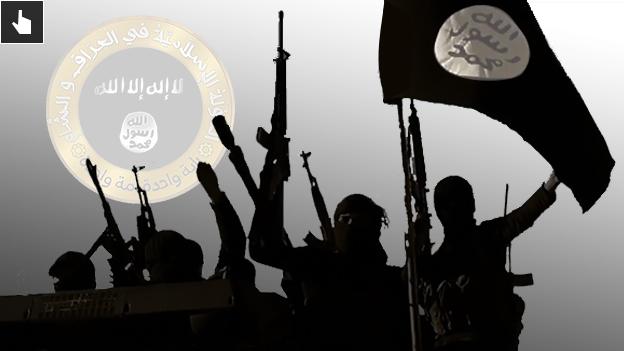

Last month, hundreds of Christian families fled Mosul after rebels gave them an ultimatum to convert to Islam, pay a special tax, or be executed.
Iraq is home to one of the world's most ancient Christian communities, but numbers have dwindled amid growing sectarian violence since the US-led invasion in 2003.
Iraqi Prime Minister Nouri Maliki has faced calls from Sunni Arab, Kurdish and some Shia Arab leaders to step down because of his handling of the security crisis, as well as what they say are the sectarian and authoritarian policies he pursued during his previous two terms in office.
But as leader of the bloc that won the most seats in April's parliamentary elections, Mr Maliki has demanded the right to attempt to form a governing coalition.

Iraq's minorities
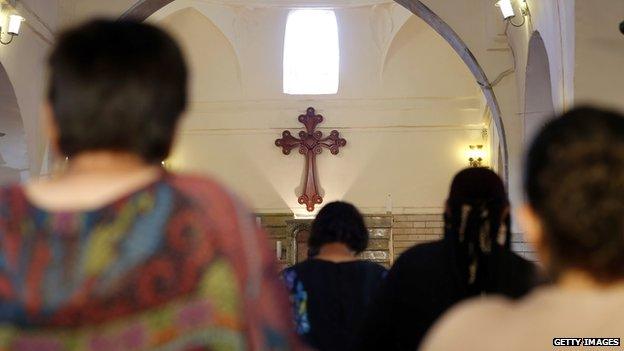
Iraq's Christian population has plummeted in recent years
Christians
The majority are Chaldeans, part of the Catholic Church
Numbers have fallen from around 1.5 million since the US-led invasion in 2003 to 350,000-450,000
In Nineveh, they live mainly in towns such as Qaraqosh (also known as Baghdida), Bartella, Al-Hamdaniya and Tel Kef
Yazidis
Secretive group whose origins and ethnicity are subject to continuing debate
Religion incorporates elements of many faiths, including Zoroastrianism
Many Muslims and other groups view Yazidis as devil worshippers
There are estimated to be around 500,000 Yazidis worldwide, most living in Iraq's Nineveh plains

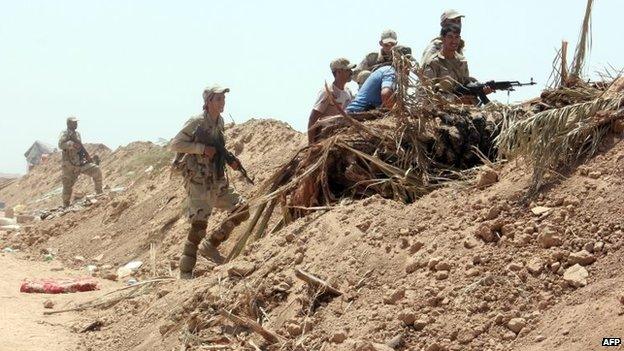
Iraqi volunteers have joined government forces to fight against IS militants
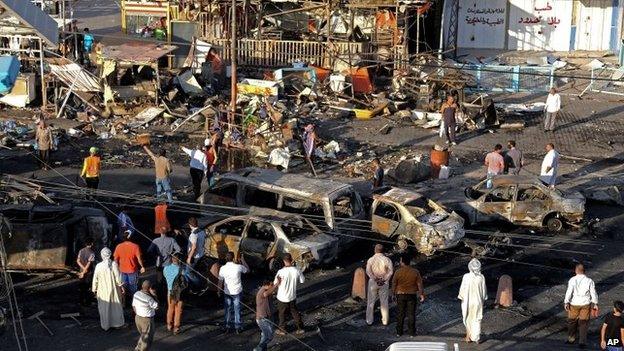
IS is also thought to be behind a string of car bombs in Baghdad on Wednesday
- Published7 August 2014
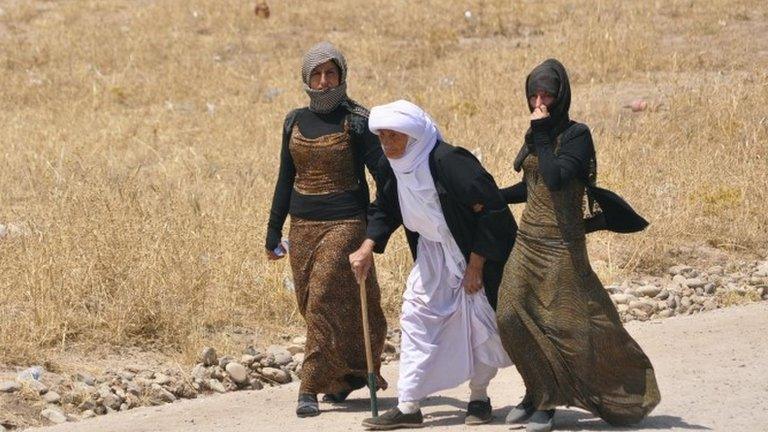
- Published21 July 2014
